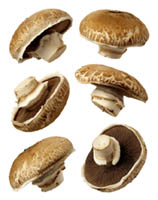Mushroom Nutrition Facts

When it comes to selenium content, mushrooms surpass all other items
in the produce category. A serving of crimini (baby portabella) mushrooms
provides almost one-third the RDA for selenium, according to the USDA
National Nutrient Database. Portabellas and white mushrooms are also good
selenium sources. With a significant amount of selenium in every serving,
mushrooms could turn out to be important ingredients in a cancer-fighting
diet, especially in lowering the risk of prostate cancer.
Selenium came to the forefront of prostate cancer research when, in 1996,
skin cancer patients were given selenium to learn whether it would prevent
recurrence. It had no effect on skin cancer, but researchers noticed that
it did decrease prostate cancer by more than 60%.
Findings from the Baltimore Longitudinal Study on Aging found that men
with the lowest blood selenium levels were four to five times more likely
to have prostate cancer than those with the highest selenium levels. Furthermore,
blood selenium levels appear to decrease with age, suggesting that older
men should add more selenium to their diets.
Mushrooms are good sources of three essential B-vitamins: riboflavin,
niacin and pantothenic acid. Mushrooms are a particularly rich source
of riboflavin: one portabella mushroom takes care of nearly one-third
our RDA; a serving of white or crimini mushrooms supplies one-quarter
of what we need daily.
Mushrooms are an under-recognized source of potassium, an element that
helps regulate blood pressure, helps keep the right balance of water in
fat and muscle tissues, and helps ensure the proper functioning of cells.
A 3-ounce portabella mushroom cap provides more potassium than a banana
or an orange.
Whether you're counting carbs or calories — or just trying to include
more healthful foods in your diet — fresh mushrooms are an ideal
fit. Five medium mushrooms contain only 20 calories, 3 grams of carbohydrate,
and are virtually fat free.
|